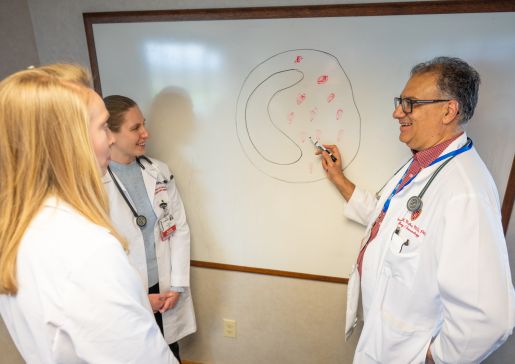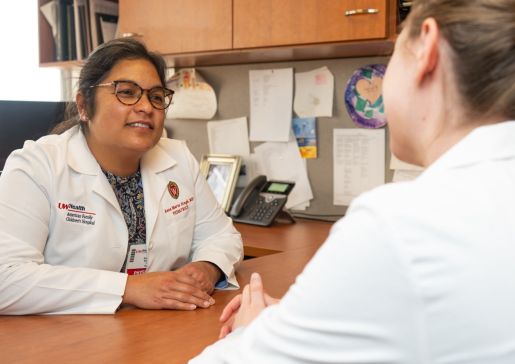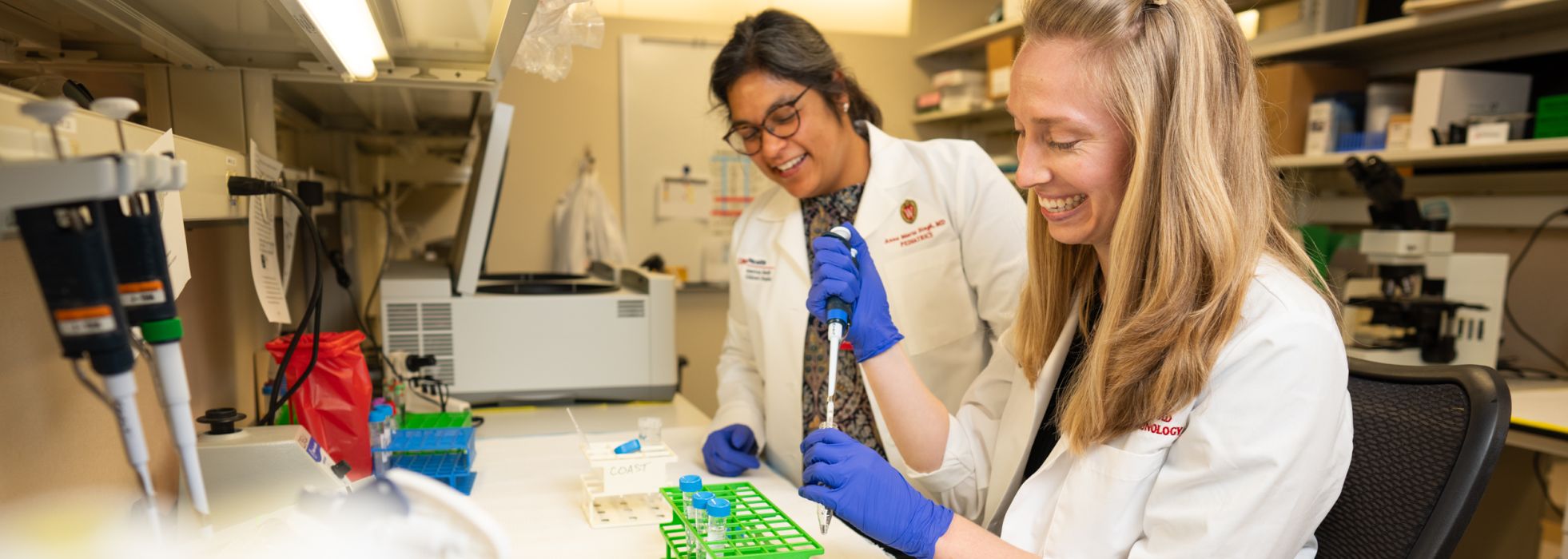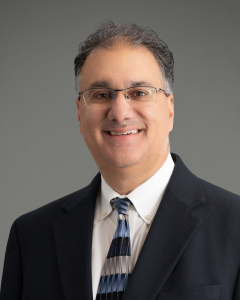Advanced Training in Allergy Research
The Wisconsin Allergy Research Training (WiscART) program trains postdoctoral fellows in Allergy and Immunology to prepare for careers as independent academic research scientists.
We are proud of our high rates of recruitment and participation by underrepresented minorities and women. Half of our fellows pursue academic careers upon graduation.
The program is funded by a National Institute of Health (NIH)/National Institute of Allergy and Infectious Diseases (NIAID) Institutional National Research Service Award (T32).


To apply, you must be a postdoctoral student or a physician who has completed residency training in pediatrics or internal medicine.
For physicians, the Departments of Medicine and Pediatrics leverage the T32 award by providing salary support and stipends for additional training years not covered by WiscART.
There is currently an opening for a PhD postdoctoral trainee to begin either July 1 or August 1 of 2025. Please see the requirements below to apply.
Interested candidates should submit the following to Rachael Meline by 11:59 pm on Friday, April 18, 2025:
- CV
- Statement of research interest
- Letter of support from research mentor. If you have not yet selected a research mentor, we can arrange interviews with selected mentors.
Current Fellows
Mentor: Dan Jackson, MD
Project: Module Decoherence
Mentor: Caitlin Pepperell, MD
Project: Mycobacterium tuberculosis
Mentor: Sameer Mathur, MD, PhD
Project: Biologics in Severe Asthma
Mentor: TBD
Project: TBD
Graduate Success

Amaziah Coleman, MD
Class of 2015
Post-graduate employment: Medical officer and physician, National Institutes of Health/National Institute of Allergy and Infectious Diseases (NIAID), Rockville, MD
Research focus: Dr. Coleman's research focuses on pediatric asthma and food allergy and improving health equity in asthma and allergic diseases. She currently leads studies in the Childhood Asthma in Urban Settings (CAUSE) consortium, the Atopic Dermatitis Research Network (ADRN) and the Consortium of Eosinophilic Gastrointestinal Disease Researchers (CEGIR) in the Allergy, Asthma and Airway Biology Branch in the Division of Allergy, Immunology, and Transplantation at NIAID.
How our program prepared her:
"During my fellowship training, I was allowed to explore career opportunities in clinical medicine and basic science research. With Dr. Gern’s mentorship, I was the first fellow to pursue a certificate in Clinical and Community Outcomes Research through the UW Institute for Clinical and Translational Research.
During my fellowship, I published two peer-reviewed journal articles, two review articles, and a book chapter. I was able to conduct an observational study focused on parental perceptions of early peanut introduction in parallel with the updated early peanut introduction guidelines during my fellowship.
These experiences helped shape my work on food allergy outcomes in the DC metro area and my current work at NIAID addressing disparities in asthma and allergic disease. I’m grateful for Dr. Gern’s investment in my career. I continue to benefit from his mentorship and aim to pay it forward in my current and future work."
Leadership
Associate Director
Principal Investigator
Associate Director
Faculty Mentors
- All Faculty Mentors
- Allan Brasier, MD: Professor, Department of Medicine; Senior Associate Dean for Clinical and Translational Research, UW School of Medicine and Public Health; Executive Director, UW Institute for Clinical and Translational Research
- Cameron Currie, PhD: Professor, Department of Bacteriology
- Richard Davidson, PhD: Founder and Director, UW-Madison Center for Healthy Minds
- Loren Denlinger, MD, PhD: Professor, Department of Medicine
- James Gern, MD: Professor, Department of Medicine and Department of Pediatrics
- Anna Huttenlocher, MD: Professor, Department of Pediatrics
- Daniel Jackson, MD: Professor, Department of Pediatrics
- Nizar Jarjour, MD: Department of Medicine
- Lindsay Kalan, PhD: Department of Medical Microbiology and Immunology
- Bruce Klein, MD: Professor, Department of Pediatrics
- Sameer Mathur, MD, PhD: Associate Professor, Department of Medicine
- Deane F Mosher, MD: Professor, Departments of Medicine and Biomolecular Chemistry
- Claire O’Leary, PhD: Assistant Professor, Department of Pediatrics
- Irene Ong, PhD: Assistant Professor, Departments of Obstetrics and Gynecology and Biostatistics and Medical Informatics
- Nathan Sandbo, MD: Associate Professor, Department of Medicine
- Christine Seroogy, MD: Professor, Department of Pediatrics
- Christine Sorkness, PharmD, RPh: Professor, School of Pharmacy
- Anne Marie Singh, MD: Associate Professor, Department of Pediatrics
- Zhenghzheng (Jane) Tang, PhD: Assistant Professor, Department of Biostatistics and Medical Informatics
Mentoring Plan
- Needs Assessment
- Trainee self-assessment of research skills and core competencies
- Follow-up discussions with mentor and program leaders to review discuss career tracks and goals
- Individual Development Plan
- Select courses and curricula to fulfill core competencies
- Design learning plans and evaluations
- Provide certification in clinical and/or translational research for trainees who seek it
- Teach compliance with federal regulations on the responsible conduct of clinical research
- Identify extramural grant opportunities for scientific endeavors after graduation
- Core Competencies
- Research core skills
- Biostatistics and study design*
- Medical ethics and responsible conduct of research*
- Leadership and management*
- Presentation and teaching*
- Scientific writing*
*Learning activities offered through resources at the University of Wisconsin Institute for Clinical and Translational Research
- Clinical Research Curricula
All trainees first complete a four-hour online course, “The Basics of Conducting Clinical Research at UW–Madison."
Mentored research is the cornerstone of the WiscART program and how most trainees spend their time in years 2, 3, and beyond.
Mentor and research project selection is a mutual decision based on project availability and trainee interests. The mentor advises and supervises all aspects of the research process, evaluates trainee progress through daily interactions and weekly laboratory meetings, and submits written evaluations to the trainee and program directors every six months. Trainees can switch projects and/or mentors if needed.
Each trainee is assigned a mentoring committee. Committee members send written comments to the fellow and their portfolio and track progress and problems longitudinally.
Trainees have a formal performance review every six months. Reviews include a self-assessment, a written assessment from the mentors, and a follow-up discussion on the IDP and goals for the next six months. Program directors also collect additional assessments, including the In-Training examination and course grades.
UW ICTR staff help evaluate learning objectives related to biostatistics, medical ethics, scientific writing and grant writing through mechanisms specified in the ICTR Capstone certificate or Masters in Clinical Research programs. These evaluations occur every six months.
- Capstone Certificate
The UW Institute for Clinical and Translational Research offers two capstone certificate programs—Fundamentals of Clinical Research and Clinical and Community Outcomes Research—plus advanced degree programs.
Designed for health care professionals, these programs consist of 13-14 credit hours of coursework that provide formal training and a practicum in research design and statistical analysis for clinical research.
All WiscART physician trainees must obtain a capstone certificate, or demonstrate that they have completed equivalent coursework. PhD trainees pursuing clinical or translational work are also encouraged to supplement previous coursework with curriculum that addresses gaps identified through needs assessment and discussions with their research mentors. Trainees may add more credits to obtain the MS or PhD in Clinical Investigation.







